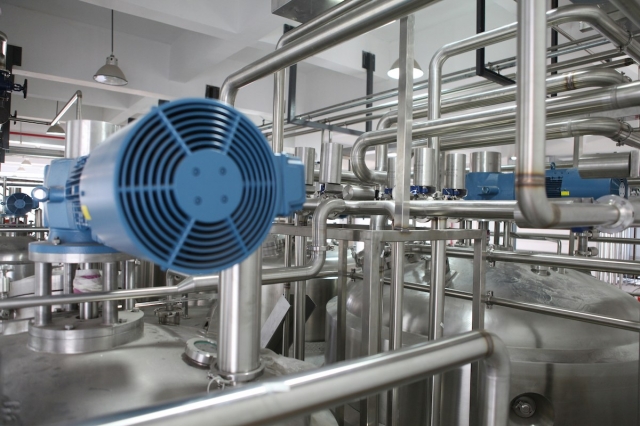Rotary diaphragm pumps are widely used across various industries due to their ability to handle a broad range of fluids, including abrasive, viscous, and chemically aggressive substances. One of their primary applications is in the chemical processing industry, where they are used for transferring corrosive chemicals, acids, and solvents. Their non-metallic, chemically resistant diaphragm pump materials—such as PTFE and EPDM—make them ideal for safely handling hazardous fluids without leakage or contamination. Additionally, these pumps provide precise metering and dosing capabilities, ensuring accurate chemical injection in water treatment plants, laboratories, and industrial manufacturing processes.
Big for and in the food and beverage industry
In the food and beverage industry, rotary diaphragm pumps are essential for handling sensitive and high-viscosity products such as syrups, sauces, dairy products, and fruit concentrates. Their low-shear pumping action preserves the texture and quality of food products, preventing damage to delicate ingredients. Furthermore, their hygienic design, often made with FDA-approved materials, allows for easy cleaning and compliance with strict sanitary regulations. Many rotary diaphragm pumps are used in applications requiring Clean-in-Place (CIP) systems, reducing downtime and ensuring food safety.
Also used in the pharmaceutical and biotechnology sectors
The pharmaceutical and biotechnology sectors also rely on rotary diaphragm pumps for transferring and dosing liquid medications, vaccines, and other biological materials. The precise flow control and contamination-free operation make them suitable for applications where sterility and accuracy are critical. These pumps are often used in the production of injectable drugs, fermentation processes, and filtration systems, where maintaining product integrity is essential.
In agriculture and irrigation, rotary diaphragm pumps are commonly used for pesticide and fertilizer injection, as well as water treatment in irrigation systems. Their ability to handle abrasive suspensions and chemical solutions without clogging or excessive wear makes them a reliable choice for farmers and agricultural operations. Additionally, their self-priming nature and ability to operate in remote areas with minimal maintenance make them highly efficient for field applications.
Another major application is in wastewater treatment and environmental management, where these pumps are used for sludge transfer, chemical dosing, and dewatering processes. Their ability to handle sludge with high solid content and their resistance to corrosive and hazardous waste materials make them ideal for municipal and industrial wastewater treatment plants. By efficiently handling thick slurries and aggressive chemicals, rotary diaphragm pumps contribute to environmental sustainability and regulatory compliance.
Overall
Overall, the versatility, efficiency, and durability of rotary diaphragm pumps make them indispensable in industries ranging from chemical processing and food production to pharmaceuticals, agriculture, and environmental management. Their ability to handle a wide range of fluids with precision and reliability ensures their continued importance in modern industrial applications.






